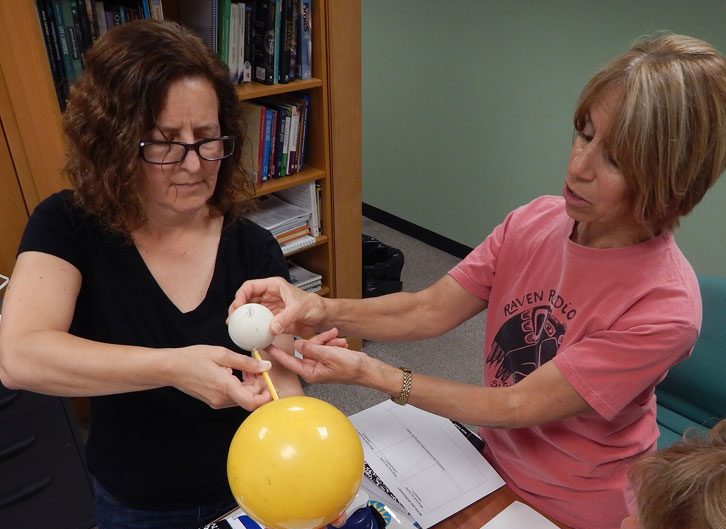Friday, September 11, 2020
For Immediate Release
Educators Blend Phenomena and Place-Based Learning with Inquiry To Spark Their Students’ Interest in Science
Quincy, MA/Online – Some students come to school already thinking science is amazing, but teachers have to find ways to make science phenomenal for all their students. How can educators excite their students for STEM by connecting them to their world, even while working remotely? This summer, New England educators explored tools to teach science by using phenomena and place-based learning to spark wonder and to frame inquiry-based instruction. Educators gained access to STEM content expertise and resources from the Wade Institute for Science Education and its partners New England Aquarium and Hitchcock Center for the Environment during a virtual Summer Professional Development Institute, “Making Place-Based Learning Phenomenal,” designed to support them in their implementation of inquiry-based science instruction in both socially-distanced in-person and remote classroom settings.
Beginning July 14th, grades 4-12 educators met via Zoom web conferencing for a series of ‘on-site’ days during which they explored strategies for using phenomena and inquiry-based instruction to engage students in place-based investigations of their local environments. Through inquiry-based, hands-on, minds-on activities, live discussions, small group work, and virtual site-visits of the New England Aquarium and Hitchcock Center for the Environment, teachers tested methods to strengthen their remote teaching practice as they used phenomena to explore place-based investigations related to climate change and sustainability.

Educators designed models of phenomena from their remote classrooms during this Summer Professional Development Institute.
With the New England Aquarium, educators gained a better understanding of place-based climate change phenomena such as urban heat-islands and impacts of sea level rise on coastal flooding. They engaged in the Science and Engineering Practices as they used models to visualize and explain phenomena and to communicate problems and mitigation solutions to community stakeholders. During live virtual discussions and small-group collaboration, educators experienced the power of using phenomena to engage their students in identifying and investigating place-based problems and developing community action projects and public engagement plans.
Teachers further investigated phenomena in the context of place-based learning by examining the impacts of animal behaviors on the local environment. Educators explored the natural history of beavers and the impacts of their engineering skills on Western Massachusetts environments by observing beaver adaptations and ecological relationships using a variety of online media sources and engaging in live virtual discussions led by the Hitchcock Center for the Environment. During a dam-building engineering design challenge, teachers applied their new knowledge of beaver behavior and experienced firsthand the potential for creating hands-on, minds-on activities in which students can collaborate remotely to design, build, and test an engineered prototype.
By integrating investigation of phenomena into place-based learning, educators refined their knowledge of pedagogical strategies (such as generating investigative questions, modeling, and productive talk) for creating dynamic and collaborative hands-on and inquiry-based remote learning experiences for their students. As part of a peer learning community, teachers worked together to identify phenomena for classroom-based and remote learning investigations and to address the advantages of phenomena-driven education, choosing appropriate phenomena, assessing phenomena-based learning, and planning phenomena-driven units using storylines. Their week of learning culminated into the designing of their own investigations and unit plans using phenomena and location as starting points for engaging students in inquiry-based learning that develops their sense of wonder for their world and invigorates their curiosity. “It was good to hear what my peers are thinking about bringing back in terms of phenomena to use with their students,” said one participant. “It reminded me that we can engage in this kind of teaching and learning with our students with phenomena that are right there in front of us; we do not have to shoot for the sun, the moon and the stars. Sometimes looking closely and thinking deeply about things that we may never have bothered to notice before in our environment is a great place to launch inquiry-based learning.”
Throughout the institute, educators integrated the theory and practice of inquiry-based education with the Science and Engineering Practices, and made connections across disciplinary core ideas in science. They took on the role of the learner and gained insights into the varied levels of student-driven inquiry that they can use in their teaching. By participating in place-based and phenomena-based activities and investigations as a learner and reflecting on their experiences as an instructor, educators found new ways to engage their students in hands-on, minds-on science learning. When they return to their in-person or remote classrooms, teachers will be equipped with inquiry-based lessons and unit plans that they designed during the institute to excite more learners for STEM by making place-based science learning phenomenal for all students!

Educators discovered ways to use inquiry-based and place-based learning strategies to make science phenomenal for all their students.
Making Place-Based Learning Phenomenal will be offered again as a Fall Professional Development Institute to support educators’ use of phenomena to excite their students for science learning using inquiry-based and place-based pedagogy.
About the Wade Institute for Science Education
The Wade Institute for Science Education is a 501 (c)(3) Massachusetts-based nonprofit dedicated to hands-on, minds-on, inquiry-based science education. We connect classroom teachers and informal educators with science, technology and engineering content expertise, inquiry-based instructional methods, regional STEM resources, and peer learning communities. We help educators discover first hand the value of inquiry-based learning, and master innovative ways to spark students’ curiosity for STEM. For more information, visit www.wadeinstitutema.org or call 617-328-1515.
###
